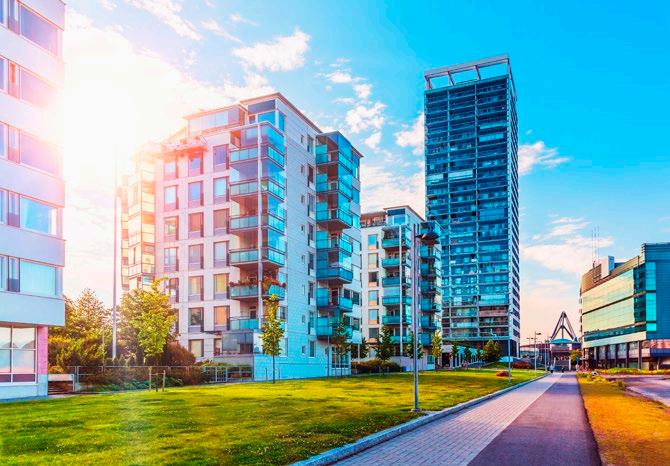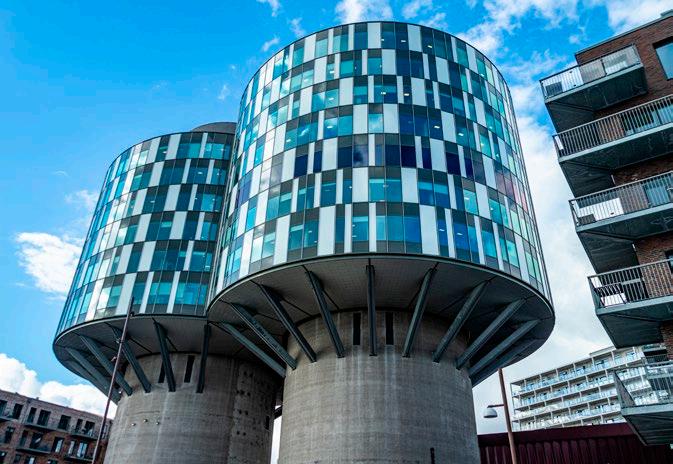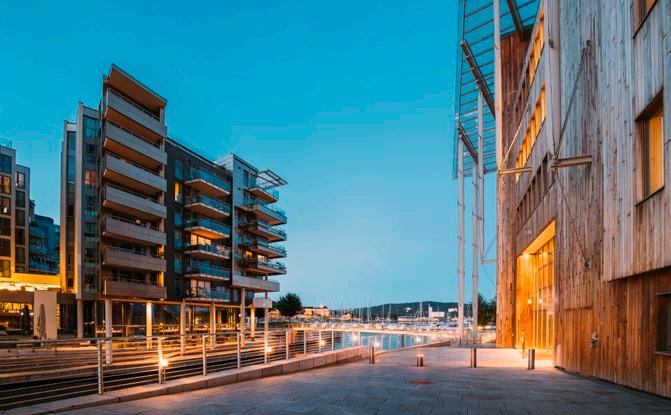
4 minute read
The Lithuanian Property Market
THE LITHUANIAN PROPERTY MARKET RESULTS SHATTER PESSIMISTIC ECONOMIC FORECASTS
Lithuania has managed to bring the covid-19 pandemic under control and the first wave, unlike in some other countries around the world, has been halted. Strict lockdown restrictions were implemented early and in June, many measures could be lifted. Amid initial signs of recovery of the country’s economy, Lithuania’s GDP growth forecasts for 2020 were improved. Nevertheless, a GDP contraction of -5.4% in 2020 is still forecast, followed by growth of 5% in 2021. It is projected that, due to the impact of the pandemic, the unemployment rate will rise to 9.5–11.9% this year, and the average inflation rate for the year will be 0.6–0.7%. The Lithuanian economy remains in a strong state, as can be seen from the country having one of the lowest GDP contractions in Europe in Q2 2020, at just -3.8%.
Despite the circumstances, there has been no slowdown on the Lithuanian real estate market. Developers have continued to complete planned projects and proceeded with new construction. The rental market was also more active than expected in the first half-year. The most notable office lease transactions were signed by Western Union for 15,000 sqm and Telia for 7,000 sqm of office space. These were the biggest office signings in Vilnius and in all the Baltic countries in 2020, constituting active expansion of service centres that are already operating on the market. In terms of transaction volume, this remained quite high in H1 2020. Total investment into Lithuania constituted one third of the total Baltics transaction volume, at just over EUR 115 million. This is only 9% less than the same period in 2019.
Photo: Lords LB Asset Management
The office segment was the most active, accounting for more than 85% of total volume in Lithuania. The total annual volume of investment transactions in the Baltic region, including Lithuania, will decrease in 2020. As most investment transactions tend to be concluded in the second half of the year, the reduced activity may cut down the total amount of investments to a level below EUR 500 million in the Baltic region, and EUR 150 million in Lithuania.
Contact: Kristina Živatkauskaite ˙ k.zivatkauskaite@newsec.lt
Interesting trends on the Lithuanian investment market in 2020:
TWO LARGE OFFICE INVESTMENT TRANSACTIONS
At the beginning of 2020, Lithuanian-based Lords LB asset management company purchased the IBC business centre in Vilnius, with a total area of 22,700 sqm, from INVL Real Estate for EUR 33 million. Meanwhile, following the lifting of the lockdown restrictions, Zenith AM acquired the second phase of the Park Town business centre from the Lithuanian developer Darnu Group. The total investment transaction volume of the two project phases is close to EUR 75 million. The first stage was acquired in 2018 and the second was closed after the construction completion and full occupancy of the project. High-quality prime offices are on investors' wish lists and the sale of Park Town is one of the first post-lockdown transactions on the Baltic real estate investment market.
NEWLY CONSTRUCTED OFFICES AND LOGISTICS CENTRES REMAIN ATTRACTIVE TO INVESTORS
As a result of the pandemic, banks are hesitant, and financing volumes have fallen sharply. Therefore, equity investors are in the most favourable position. Typically, such investors buy so-called core or prime products, that is new construction or very good offices that are in the central business districts of the city or in the old towns. The logistics segment is attractive as well, and is considered to be second on the list of most demanded assets.
GDP GROWTH
-5.4% GDP growth expected in 2020
EUR 150 MILLION Total investment volume of EUR 150 million expected in 2020
115,000 SQM of office space to come to the Vilnius office market in 2020
LITHUANIA REMAINS A STABLE INVESTMENT LOCATION
Internationally, Lithuania is considered a reliable country. With many countries downgraded in the face of the pandemic, the international credit rating agency Fitch Ratings affirmed Lithuania's A long-term debt rating in January 2020 and kept a stable outlook. Government debt had been relatively stable, until the economic downturn caused by covid-19. Now, it is likely to reach 50% of GDP shortly, and will begin to approach 60%. Nevertheless, Lithuania continues to borrow on both domestic and foreign markets at the lowest pricing levels in history.
OFFICE CONSTRUCTION AT RECORD LEVELS
Upon the completion of all planned 2020 projects, space on the Vilnius office market will increase by 115,000 sqm or 18%, and the vacancy rate may grow to 7-10%. 2020 will be a record year in terms of new supply of office space in a single year – in comparison, over the last five years, an average of 65,000 sqm of new space was completed per year. In any case, increased supply on the office market will create new opportunities for both tenants and investors.
PRECISE IMPACT ON YIELDS REMAINS UNCERTAIN
So far, the sales prices of the most attractive segments (logistics and offices) were not significantly affected. Yields have remained just below 6% for the prime office segment, and 7.6% for the industrial segment. However, it is necessary to keep monitoring the end of the 3rd quarter of 2020. This will be the period when postponed mortgage payments or rental discounts granted to businesses in the Baltic states will end. This will show which property owners have been hit hardest by the covid-19 pandemic. At this time, it will also become clear whether the increased sensitivity in the retail segment and fluctuating consumer demand will reflect on prime retail yield growth.









